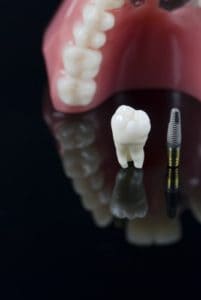 Tooth loss is incredibly common. According to the American College of Prosthodontists, 120 million people in the U.S. are missing at least one tooth, and more than 36 million Americans are missing all of their teeth.
Tooth loss is incredibly common. According to the American College of Prosthodontists, 120 million people in the U.S. are missing at least one tooth, and more than 36 million Americans are missing all of their teeth.
If you have lost one or more teeth, the team at Northfield Dental Group assures you that you have several replacement options, including dental implants and dentures. Learning more about the mechanics, pros and cons of each option can help you evaluate which may be right for you.
How Dentures Work
Dentures are removable appliances made of a pink-colored acrylic base that supports artificial teeth. Dentures rest on top of the gums where the missing teeth used to be, and are held in place with special adhesive or paste.
Pros of Dentures
- Modern dentures closely resemble natural teeth and gum tissue.
- Dentures can be used to replace some or all of the teeth in the mouth. Complete dentures replace all of the teeth in the upper and/or lower jaw, and partial dentures fill in gaps between teeth that are still intact.
- The process to fit and place dentures is fairly short and non-invasive.
- Dentures are a cost-effective option.
Cons of Dentures
- It can be difficult to adjust to wearing dentures; they may cause increased salivation, and it can be hard for the muscles of the mouth to adapt to the devices.
- Dentures need to be removed regularly for special cleaning, which can be inconvenient.
- Dentures may slip or slide out of place while eating or speaking.
- Sometimes dentures make clicking or popping noises while eating or speaking.
- Dentures do not keep the underlying jawbone stimulated. As a result, the jawbone can deteriorate.
- Dentures need to be regularly relined, repaired or replaced as the gums and facial structures change with age.
How Dental Implants Work
Dental implants are anchored to the underlying jawbone via a titanium post or screw. The post or screw acts as a solid and stable foundation for an artificial tooth. Implants can support an individual crown, bridge or denture appliance.
Pros of Dental Implants
- Implants are strong and can bite or chew virtually any foods.
- Because they act just like natural, healthy teeth, implants help preserve the integrity of the jawbone and the facial structures.
- Implants can be used to secure dental prosthetics like bridges or dentures into place to improve fit and stability.
- Dental implants require no special maintenance (above and beyond brushing, flossing and being checked by a dentist regularly).
- With the proper care, implants can last indefinitely.
Cons of Dental Implants
- The process to place dental implants is lengthier and more invasive than the process to place dentures.
- Adequate jawbone is needed to support and retain the implant post. Additional procedures such as bone grafting may be needed to prepare the mouth for dental implant placement.
The planning and placement of dentures or dental implants requires the skill and expertise of a highly trained dentist. To learn more about your tooth replacement options, please contact the team at Northfield Dental Group today.




 Our Practice
Our Practice Our Doctors
Our Doctors Blog
Blog Special Offers
Special Offers Financing
Financing Testimonials
Testimonials